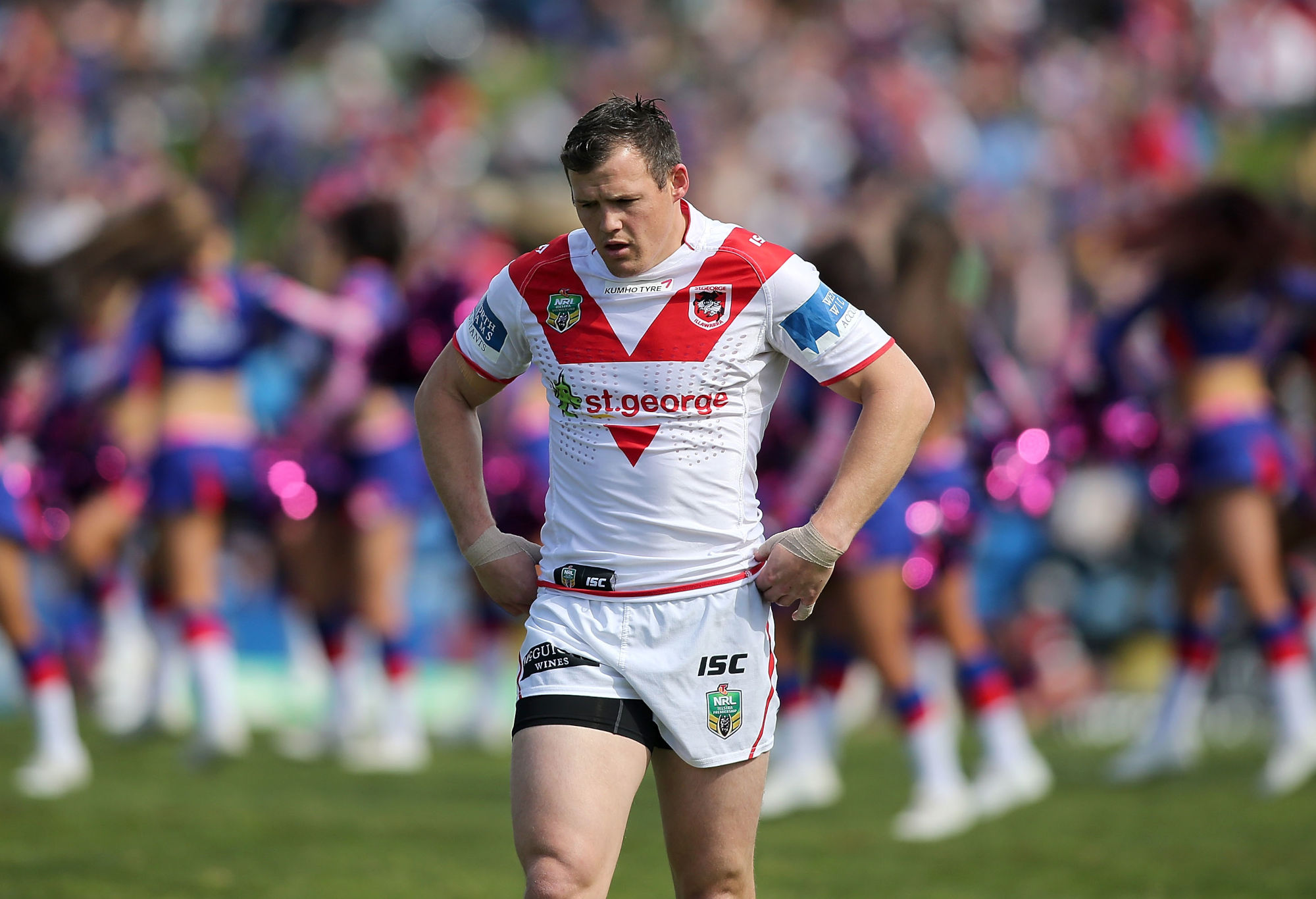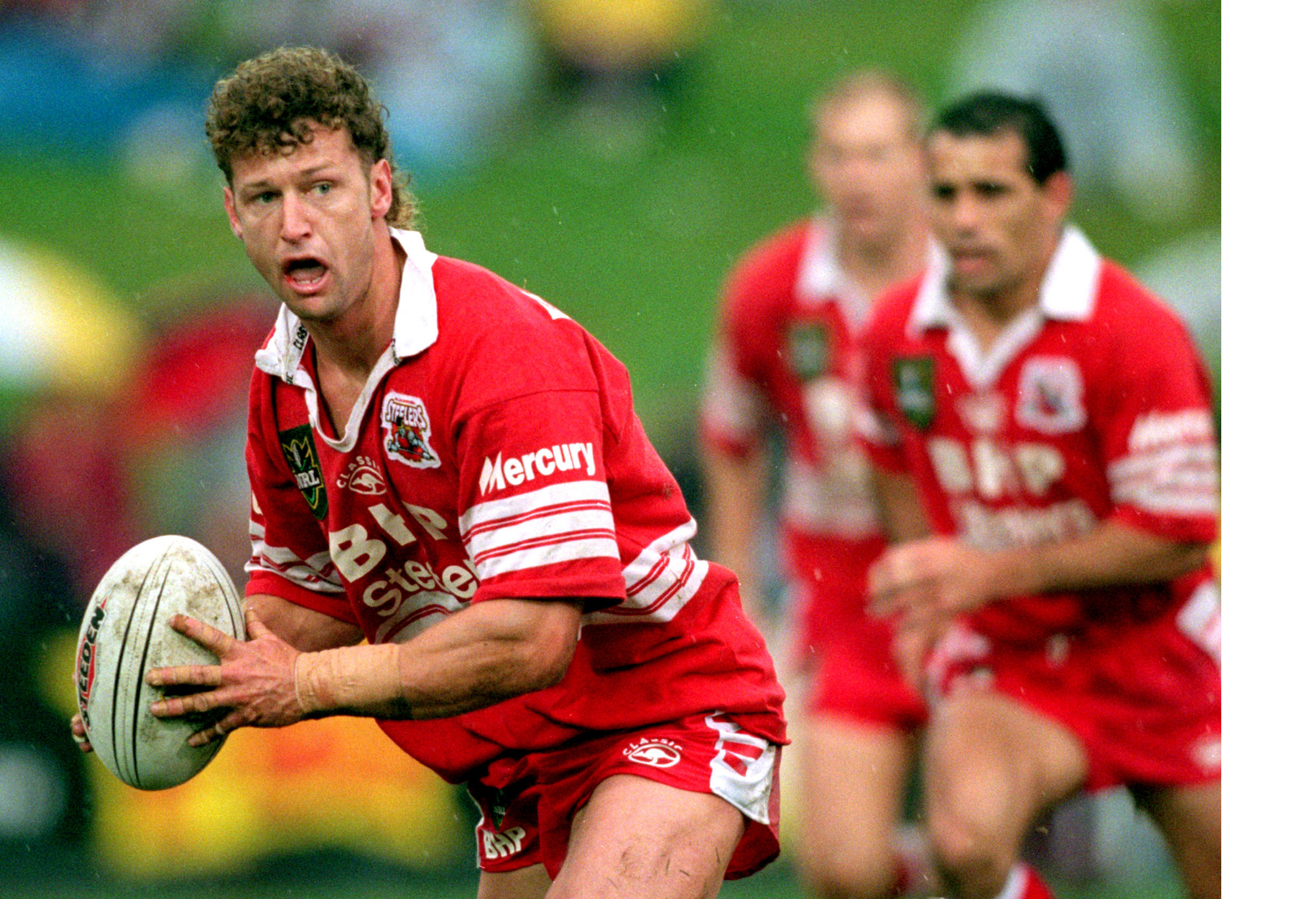
The team was chosen by a panel of former St George players, officials, rugby league journalists, and historians. They considered a range of criteria, including skill, durability, courage, versatility, leadership and representative honours, and players who have represented the St George-Illawarra merger were eligible.
For those of you who missed it, here’s the team they came up with:
1. Graeme Langlands
2. Johnny King
3. Reg Gasnier
4. Mark Gasnier
5. Eddie Lumsden
6. Brian Clay
7. Billy Smith
8. Billy Wilson
9. Ken Kearney
10. Craig Young
11. Norm Provan
12. Rod Reddy
13. Johnny Raper
14. Harry Bath
15. Doug McRitchie
16. Neville Smith
17. Ian Walsh
Not surprisingly, it’s a very impressive side, full of Rugby League Immortals and Hall of Famers. It’s hard to argue with most selections, although some may consider Mark Gasnier, Craig Young, Doug McRitchie, and Neville Smith lucky to make the side. To me though, the strength of this team is the quality of the players they had to leave out.
Here’s my take on the Dragon’s “Second Greatest Team of the Century”.
Fullback – Ted Goodwin
“Lord Ted” was a wonderful attacking player who played 116 games for the Dragons, crossing for 52 tries. He was a part of their 1977 premiership-winning team and also represented both NSW and Australia. An excitement machine.
Wingers – Brett Morris and Noel Pidding
Morris is arguably the greatest winger of the NRL era, and crossed for 112 tries in his 169 games with St George. He sits in 4th place on the all-time try scoring list, won a premiership with the Dragons in 2010, and played 18 Tests for Australia and 15 Origins for NSW. If a try was on, Morris scored it.

Brett Morris (Photo by Tony Feder/Getty Images)
Pidding scored nearly 600 points in his 104 games for St George, was part of their victorious 1949 side, and played 19 tests for Australia and 30 games for NSW. He was also a handy fullback.
Centres – Matt Cooper and Jack Lindwall
Cooper was a club stalwart who played 244 games for the Dragons, crossing for 125 tries. He played 7 Tests for Australia, 13 Origins for NSW, and was a member of their 2010 premiership-winning side. Quick, super-fit and also a great defender.
Lindwall played 133 games for the club and notched up 110 tries. He was a brilliant attacking player who crossed for six tries in a game against Manly in 1947, and crossed for five tries in a game on five occasions. He scored tries in St George’s grand final losses in both 1942 and 1946 and held the club records for tries scored until eventually being overtaken by Johnny King.
Five Eighth – Trent Barrett
Barrett played 154 games for the Dragons, 15 Test matches and 11 Origins for NSW. He was one of the great halves of the NRL era and combined great attacking skill with hard-hitting defence.
Halfback – Bob Bugden
Bugden was a prolific try scorer for a halfback and crossed for 57 three-pointers in his 135 games for the club. He was halfback in six consecutive grand final victories between 1956 and 1961, and also represented both NSW and Australia, crossing for three tries against France in his test debut. Somewhat forgotten these days but an outstanding player in the 1950s.
Lock – Brad Mackay
Perhaps the only player to play for both St George and Illawarra before joining the merger, Mackay played a total of 140 games for “Dragons” teams. A renowned utility player, he won a Clive Churchill Medal, and played 12 tests for Australia and 17 Origins for NSW. He had the ability to play almost anywhere on the field.

Brad Mackay (Photo by Getty Images)
Second Rowers – Elton Rasmussen and Dick Huddart
Rasmussen combined excellent ball skills with good old-fashioned strength and brutality, and was equally at home in either the second row or at prop. He was one of the toughest players to ever come out of QLD. He played 126 games for the Dragons, won five premierships, and played 13 games for QLD, 7 for NSW and 20 Tests for Australia. Some player was our Elton.
Huddart was an early prototype of the ball-running second rower and was at his most dangerous when running on the edge of the ruck. The big Englishman played 78 games for St George, was a Lance Todd trophy winner, won a premiership with the Dragons in 1964, and played 17 Tests for Great Britain and England.
Front Rowers- Kevin Ryan and Monty Porter
Ryan was arguably the hardest and most feared front-rower ever to pull on a pair of boots and had he not left the Dragons for Canterbury in 1967, I have no doubt that St George would have extended their 11-year reign to 12 years and beyond. He played 106 games for the Dragons, won a premiership in each of the seven years he was at the club and played 8 games for NSW and 2 Tests for Australia. Kevin ruled the ruck.
Porter was another player to feature heavily during the Dragon’s 11-year reign. Although not as celebrated as some of his teammates, the Dragons would not have been as successful without Monty. He played 113 games for St George, won 6 premierships during his 8-year stay, and played 1 game for NSW.
Hooker – Arthur Justice
Justice was a pioneer of the club and led them to their first grand final appearance. He was as tough as they come, took no prisoners, and was arguably the best hooker of his era. He played 111 games for the Dragons between 1922 and 1932 as well as 6 test matches, and 33 games for NSW.
Bench – Steve Edge, Jack Holland, Ken Maddison and Barry Beath
Edge was a great leader at St George, playing 103 games for the club at hooker and winning two grand finals. He also played 1 game for NSW.
Holland was a big, no-frills front rower who played 87 games for St George and was a member of their 1949 premiership-winning team. He also played 8 Tests for Australia and 8 games for NSW. Jack was not a player to be taken lightly.
Maddison never gave an inch to the opposition on the field, and was both a devastating ball runner and a brutal defender. He began life as a centre and ended up as one of the best second rowers in the game. He played 101 games for the Dragons and won a premiership with them in 1966.
Beath was a club legend, playing nearly 200 games for St George and having the rare distinction of winning a premiership in both his first (1966) and last (1977) years in the top grade. He was a hard-working forward who was as fast as most backs, and he scored 61 tries for the Dragons. He also played one Test and three games for NSW.
How do you think this team would fare against the number one team? Who else should be considered?

Leave a Reply